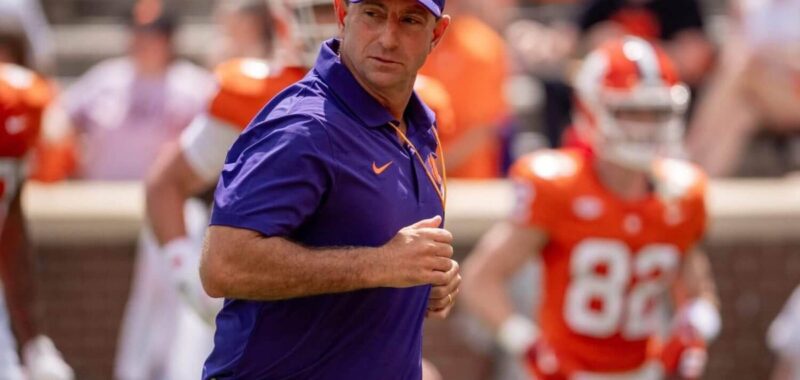CLEMSON, S.C. — Clemson football coach Dabo Swinney, known for his seeming resistance to the changes in college sports, now believes things are headed toward “probably the best era for college football.”
And a big part of that, Swinney believes, is a football super league.
The idea of reorganizing the top level of the college game away from the traditional conference model has been out there for a while, and last year a formal proposal was circulated and endorsed by a group known as College Sports Tomorrow that included the presidents of an ACC school (Syracuse) and a Big 12 school (West Virginia), among other business and sports industry leaders. Around the same time, venture capital firm Smash Capital privately pitched schools on an injection of billions of dollars to create a single business that largely maintains college football’s existing structure.
The two most powerful conferences, the Big Ten and the SEC, have shown no interest in these initiatives. Nonetheless, Swinney thinks “those dominoes are already in place” for a super league, which he thinks would include 40-50 teams. Asked whether he thinks a super league is something that will or should happen, he answered, “Both.”
“It’s not sustainable the way we are. It’s just a matter of time,” Swinney said Wednesday. “It’s one of those things even though for some of us it’s really clear to see, we’ve just gotta go through it to get there.”
One potential domino just fell into place at Swinney’s school: Clemson, along with Florida State, settled a series of lawsuits against the ACC over the league’s grant of rights, which will keep the two prestigious football brands in the conference until 2031 and will distribute more revenue to members that drive higher television viewership.
That means 2031 could kick off the next major round of realignment — perhaps including the Big Ten and SEC competing to gobble up the ACC’s biggest brands. But Swinney envisions those top 40-50 programs all joining forces, even the Big Ten and SEC, despite the fact that it would probably mean those two conferences ceding power and revenue.
“Eventually money’s going to win the day,” Swinney said. “I think other dynamics and factors will eventually come into play. I just think people are eventually going to see the business opportunity involved, and it’s going to come down to brands, and TV viewership, and all of that type of stuff. Moreso than a league (you’re in right now). Eventually that’s where it’ll get to. Who knows when we’ll get there. Probably sooner rather than later.”
Swinney saying all this is noteworthy not just because he’s a two-time national champion head coach. He has also been outspoken in recent years against what he sees as the professionalization of college sports, a stance that has gone hand in hand with his famous reluctance to pursue transfers. (Clemson did sign three transfers this offseason.)
Part of the reason Swinney sees the super league as inevitable is that the current financial model is not working for enough schools. Another reason is the appeal of getting back to regional scheduling rather than sprawling, coast-to-coast conferences, including the ACC.
“Eventually there will be a league (that) makes a little more sense, and you have a little more regionality, and you have some crossover games,” he said. “Call it whatever you want to call it, but I think the NFL’s a good model.”
But with one difference: The super league cannot just be an NFL minor league, Swinney said. It must still be college football, with the academics an important part.
“Football is not a game of longevity,” he said. “Ninety-eight percent of these kids aren’t playing pro football, so we need to really help them maximize their opportunity here. But we need to equip them for life. If you’re playing football at 27, you’re an old man. And I just feel like and worry that the game is going to use a lot of these kids right now, because the adults have kind of left the room. The adults are all downstairs sipping wine, and we’ve put a bunch of kids up in the room with fireworks and gas and knives and we don’t think anything bad is going to happen. And I just think we can be better. And I think eventually we will be better. And I think we’re really close to that.
“I think we’re heading to a much better era, probably the best era for college football. And if programs are set up the right way, we can really help them maximize this opportunity.”
(Photo: Jacob Kupferman / Getty Images for ONIT)

